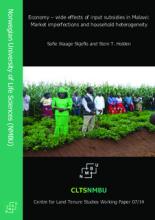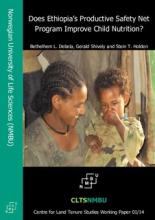/ library resources
Showing items 1 through 9 of 56.This report documents agricultural household models developed for agricultural policy analyses related to the assessment of impacts of agricultural input subsidies and maize technology choices in Malawi.
The potential benefits of providing subsidized inputs to farm-households in developing countries may reach well beyond the targeted households. More specifically, increased food productionand demand for rural labor may benefit poor households through lower food prices and higherrural wages.
Lab-in-the-field Hawk-Dove game experiments were played by spouses in a rural sample of households in Southern Ethiopia where women/wives traditionally have a weak position.
We have investigated whether joint land certification in Southern Ethiopia has contributed to a strengthening of the perceived land rights of women and an increase in their intra-household involvement in land-related decisions.
This study investigates attitudes towards legalizing land sales and Willingness to Accept (WTA) sales prices and compensation prices for land among smallholder households in four different areas in the Oromia and SNNP Regions in the southern highlands of Ethiopia.
We use recent panel data on Tanzanian farm households to investigate how previous exposure to weather shocks affects the impact of a current shock.
We study the link between Ethiopia’s Productive Safety Net Program (PSNP) and short-run nutrition outcomes among children age 5 years and younger. We use 2006 and 2010 survey data from Northern Ethiopia to estimate parameters of an exogenous switching regression.
Paginação
Land Library Search
Through our robust search engine, you can search for any item of the over 73,000 highly curated resources in the Land Library.
If you would like to find an overview of what is possible, feel free to peruse the Search Guide.








